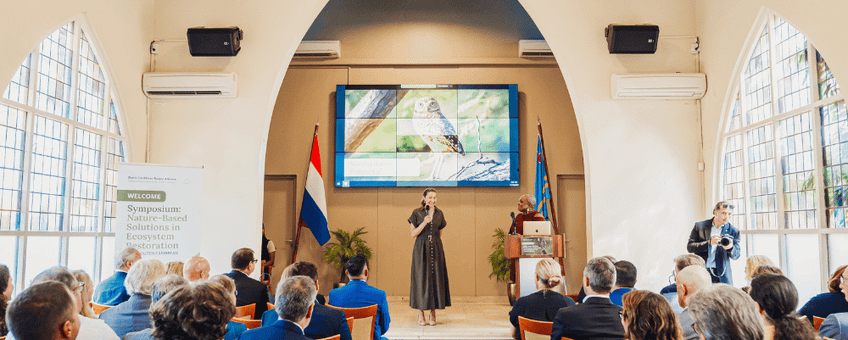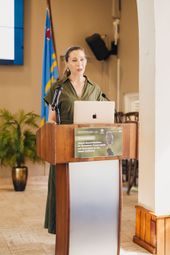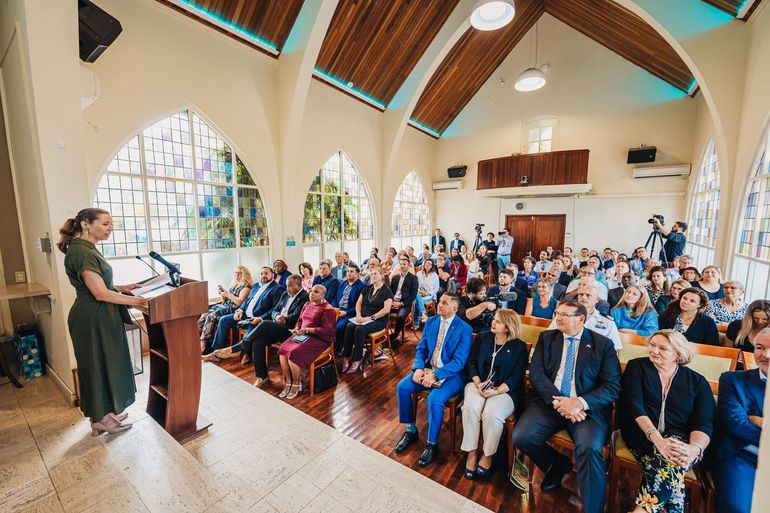
Navigating Conservation Challenges and Opportunities on Caribbean Islands
Dutch Caribbean Nature Alliance (DCNA), Aruba National Park Foundation
This presentation was given as part of the Dutch Caribbean Nature Alliance (DCNA) and Fundacion Parke Nacional Aruba (FPNA)’s symposium on Nature-Based Solutions for Ecosystem Restoration. The goal of this event was to facilitate knowledge and experience exchange and to promote the effective incorporation of nature-based solutions in Dutch Caribbean projects.
Why nature matters in the Caribbean
The Caribbean islands boast an extraordinary array of biodiversity, with a significant percentage of species found nowhere else on Earth. Ranked among the top 6 of the world’s 36 biodiversity hotspots, these islands are not only rich in life but also at high risk of destruction. The importance of this biodiversity lies in its uniqueness and the delicate balance it maintains within these island ecosystems.
Shifting baselines
The Caribbean’s endemic species are both a blessing and a vulnerability. While they are well-adapted to their environments, their susceptibility to change puts them at risk. Silva’s presentation touched upon the concept of shifting baselines, emphasizing the evolving perception of what constitutes a ‘normal’ environment. As generations pass, each one grows up in an increasingly degraded environment, not recognizing or remembering the full extent of the losses, ultimately leading to a gradual decline in species biodiversity.
Conservation efforts and challenges
Silva stressed the importance of nature-based solutions in tackling these challenges. Recognizing that nature is the foundation of the economy and essential for our existence, there is a growing understanding that our relationship with nature must change.
As we navigate the conservation challenges and opportunities on Caribbean islands, it is essential to recognize the significance of these ecosystems and the need for sustainable practices. Natasha Silva’s presentation serves as a call to action, urging us to change our relationship with nature and promote a future which is based on interconnectivity, interrelations, and the well-being of the entire ecosystem.

To watch the full video of Natasha Silva’s presentation, please see below:
Presentation by Natasha Silva. You can also watch the video on YouTube (source: DCNA)
Videos of the other presentations will be shared with you weekly. If you can't wait, (re-)watch the recording of the symposium on the DCNA YouTube channel.
DCNA
DCNA extends its gratitude towards the sponsors; Milton Harms Fonds in collaboration with Prins Bernhard Cultuurfonds Caribisch Gebied, Aruba Tourism Authority, VNO Ministerie van Binnenlandse Zaken en Koninkrijksrelaties, Grant Thornton, Dutch Postcode Lottery, and Pelican Adventure, for contributing to the symposium and supporting an environment of collaboration and progress, exemplifying the power of partnership in driving positive ecological change.
The Dutch Caribbean Nature Alliance (DCNA) was established in 2005 and represents a quintessentially Caribbean approach to nature conservation. In a highly fragmented region, the DCNA recognizes that the conservation challenges are simply too big for one organization or one island to face alone. On Aruba, Bonaire, Curaçao, Saba, St. Eustatius, and St. Maarten this truth was acknowledged and in response, the DCNA was formed, an organization with a singular voice to reflect a united effort to safeguard nature throughout the region. The DCNA believes that together we will be better able to find solutions to face these common threats. Built from the bottom up, the DCNA is a true grassroots organization, which has been able to weave together an active conservation network of autonomous organizations spanning the Dutch Caribbean.
Learn more about the DCNA by following the DCNA on social media via Facebook (Dutch Caribbean Nature Alliance), Instagram (DCNAnature), LinkedIn (Dutch Caribbean Nature Alliance) and visiting the website.
Text: Dutch Caribbean Nature Alliance
Photos: DCNA (lead picture: Natasha Silva at the symposium)
